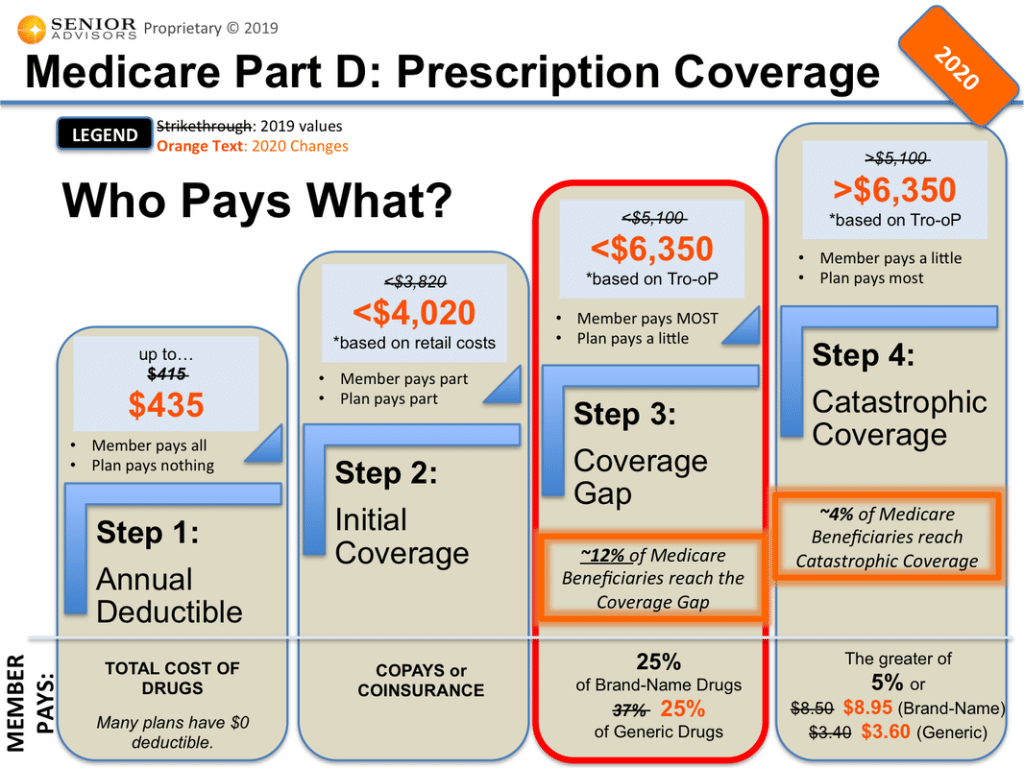Guest post by long-time SPM member Tracy Zervakis. Participatory medicine involves professionals and patients working together to get healthcare done. When a treatment plan is agreed and chosen, the best outcome obviously requires carrying out the plan – but both patients and professionals in SPM have found we’re too often blocked by bureaucratic messes like this story.
Note, it’s an intersection of good intentions by both pharma and government programs, each failing to view the problem from the patient’s perspective and take responsibility for protecting patient vulnerabilities.
How might we fix this? Let us know in the comments.

A sample Medicare Part D illustration from Senior-Advisors.com. Not shown is an additional dimension spanning all levels: pharma price protection programs may not be available to Part D patients, leaving seniors’ out-of-pocket costs unprotected.
Introduction
In the United States, Medicare Part D provides prescription drug coverage for millions of seniors and individuals with disabilities. [See sample illustration, year 2020, from Medicare advisor site Senior-Advisors.com.]
While this program has been instrumental in making medications more affordable for many, there is a significant challenge that patients enrolled in Medicare Part D face – the inability to take advantage of pharmaceutical coupon programs offered by drug manufacturers to reduce medication costs. This limitation often leaves patients struggling to afford their medications, creating financial burdens and potentially impacting their health outcomes.
The Impact of Pharmaceutical Programs on Medication Costs
Pharmaceutical programs, such as patient assistance programs and copay assistance programs, are initiatives offered by drug manufacturers to help patients afford their medications. These programs can significantly reduce out-of-pocket costs for patients, particularly for expensive specialty medications or those without generic alternatives. By providing discounts, rebates, or even free medications, pharmaceutical programs play a crucial role in improving medication adherence and overall health outcomes for patients.
The Barrier for Medicare Part D Patients
Unfortunately, patients enrolled in Medicare Part D face a barrier when it comes to utilizing these pharmaceutical programs. Federal regulations under the Medicare program restrict beneficiaries from using these assistance programs in conjunction with their Part D coverage. The rationale behind this restriction is to prevent pharmaceutical companies from influencing beneficiaries’ choice of medications based on financial incentives, thereby maintaining the integrity of the Medicare drug benefit program.
Consequences for Patients
As a result of this restriction, Medicare Part D patients are often left in a difficult position. While they have coverage for their medications through Part D, they may still struggle to afford their copayments, especially for high-cost drugs. Without the option to access pharmaceutical programs that could help offset these costs, some patients may be forced to make difficult choices, such as skipping doses, splitting pills, or even forgoing essential medications altogether.
Finding Solutions
Addressing the challenge faced by Medicare Part D patients in accessing pharmaceutical programs requires a multi-faceted approach. Policymakers could consider revisiting the regulations governing Medicare Part D to allow beneficiaries to take advantage of these assistance programs without compromising the integrity of the program. By striking a balance between ensuring patient access to affordable medications and safeguarding against potential abuse, policymakers can better support the health and well-being of Medicare beneficiaries.
In the meantime, healthcare providers, pharmacists, and patient advocacy groups can play a crucial role in helping Medicare Part D patients navigate their options for affording medications. By providing information on alternative assistance programs, exploring generic or therapeutic alternatives, and advocating for policy changes, stakeholders can empower patients to make informed decisions about their healthcare.
Conclusion
The inability of Medicare Part D patients to utilize pharmaceutical programs to reduce medication costs presents a significant challenge in the current healthcare landscape. As we strive to improve access to affordable medications and support the well-being of patients, it is essential to address this barrier and explore solutions that balance the needs of beneficiaries with the integrity of the Medicare program. By working together to advocate for change and empower patients with information and support, we can help ensure that all individuals have access to the medications they need to lead healthy and fulfilling lives.
Again, how might we fix this? Let us know in the comments.
e-Patient Dave
"e-Patient Dave" deBronkart is a co-founder of our Society and past board chair. He survived a near-fatal kidney cancer by being an e-patient long before he'd heard the word. Today he evangelizes participatory medicine, patient empowerment, and patient data access as a keynote speaker and at epatientdave.com.
Related








I do not believe that allowing Medicare recipients to NOT use these coupons makes any sense. If congress is concerned about companies ‘influencing’ consumers choice of drugs then why do they allow advertising directly to consumers at all? If this is a valid argument then all the magazine and TV ads need to end!
Beyond that the choice needs to be up to the recipients. For example- I choose to not process some medications thru insurance because it is cheaper to just pay cash. Medicare recipients should be given the option of using coupons just as you have the option of paying cash.